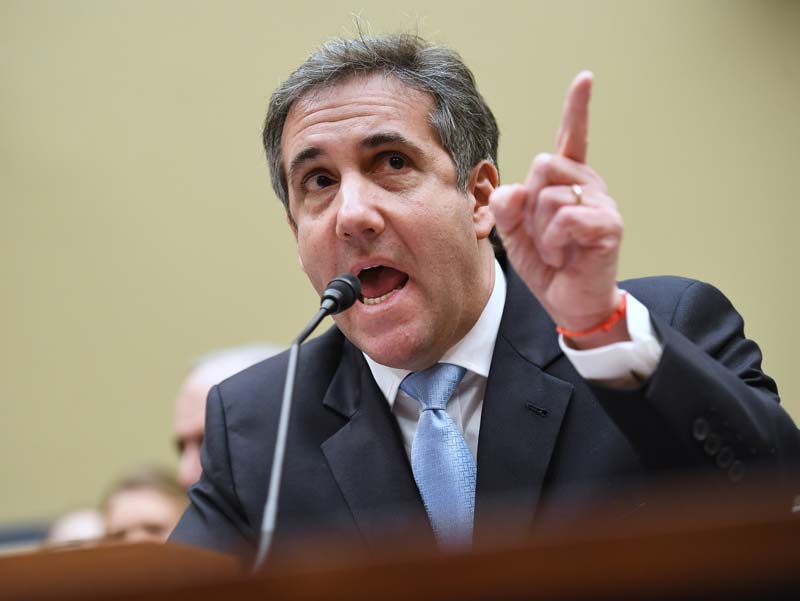 Matt McClain for The Washington Post
Matt McClain for The Washington Post
In the entrance to the US Senate members' dining room there's an old menu from March 24, 1941. On the back — presumably to record a bet — seven senators wrote the dates when they thought their country would enter the Second World War. Theodore G Bilbo, a Democrat from Mississippi, thought "never".
So did D Worth Clark, one of the two senators from Idaho. Millard Tydings, of Maryland, hedged, guessing either July 14, 1941 "or 1961".
A fourth senator said September 17, 1945. Aside from Tydings, only three of the seven predicted the nation would be at war before the end of the year, and not one of them got the month right. (They guessed July 24, August 24 and September 24, whereas the Japanese attack on Pearl Harbor was on December 7 and the German declaration of war on America on December 11.)
Now imagine a similar exercise in March 2019. On what date will Donald J Trump leave the office of president? If, as in 1941, the majority of your seven senators were Democrats, I would guess that at least three would predict January 20, 2021 — the day the constitution requires Trump to hand over the White House if he is defeated in the 2020 election. But I doubt they would all say that.
Senate Democrats are under instructions not to talk about impeaching Trump, but I am sure more than a handful think about it. So perhaps two out of seven would go for an earlier date, perhaps some time next year. But that would leave two pessimists. The first might say January 20, 2025, acknowledging that the president they love to hate could win a second term. The most pessimistic of them all, having read all those overwrought articles from two years ago about the coming Trump tyranny, might write "never".
One great benefit of recording such political wagers is that, years later, they can remind historians that the familiar past they study was once the uncertain future. We all know the United States eventually joined the fight against Axis powers. But that did not seem inevitable to many Americans, even in March 1941. In the same way, no one should pretend to know for sure how long the Trump presidency will last.
True, last week was not a good one for Trump. For the many liberal journalists yearning to re-enact Watergate, Michael Cohen's testimony before the House oversight committee on last Wednesday was beyond thrilling. Back in June 1973 this was the role played by John Dean, Richard Nixon's White House lawyer, who testified before Congress that the Watergate case was a "cancer growing on the presidency".
In his opening statement Cohen called Trump a "racist", a "conman" and a "cheat." Cohen said that, well into the 2016 presidential campaign, he was working on Trump's behalf on a big property project in Moscow, despite Trump's repeated insistence he had no business dealings with Russia. And Cohen provided fresh testimony (but no compelling evidence) that Trump was in the know about the efforts of WikiLeaks and the Russians to release dirt about Hillary Clinton at key moments in the campaign.
Yet somehow Cohen's appearance was more The Godfather or Goodfellas than All the President's Men. "How many times," asked Representative Jackie Speier, "did Mr Trump ask you to threaten an individual or entity on his behalf?" "Quite a few times," Cohen replied.
Speier: "Fifty times?"
Cohen: "More."
Speier: "One-hundred times?"
Cohen: "More."
Speier: "Two-hundred times?"
Cohen: "More."
Speier: "Five-hundred times?"
Cohen: "Probably, over the 10 years."
That's Henry Hill from Goodfellas talking, not John Dean.
I met Cohen on one occasion only, in Trump Tower in the heady days of the post-election transition in December 2016. Future White House communications director Anthony Scaramucci, whom I'd known for years, had invited me to pay a visit. It was a fascinating afternoon. I met Trump's pick for national security adviser, General Michael Flynn, who struck me as disciplined but dim. I met the soon-to-be chief strategist, Steve Bannon, who struck me as just the opposite.
But it was Cohen who convinced me that I should maintain a healthy distance of several thousand miles from the administration that was being formed. The way he talked strongly suggested that, in his eyes, the federal government was a chain of casinos the Trump Organisation had unexpectedly acquired at a bargain-basement price.
Sure enough, it turns out that Cohen's job was indeed to play the mobster on Trump's behalf. But what we heard last week was a litany of low crimes and misdeeds predating the president's inauguration, not the "high crimes and misdemeanours" in office that article 2 of the US constitution says are grounds for impeachment. In the words of Alexander Hamilton, the founding fathers had in mind "offences which proceed from the misconduct of public men, or, in other words, from the abuse or violation of some public trust".
So long as the president's party has the upper hand in the Senate, and so long as his approval rating does not collapse — as Nixon's did in the course of the Watergate hearings — any move to impeach Trump is going to fail and might even backfire on the Democrats, as impeaching Bill Clinton backfired on the Republicans in the 1990s. Reality check: Trump's job approval number is currently 44%, exactly what it was at the start of his presidency and substantially above the low (37%) of December 2017. By the time Nixon was forced to resign, his approval was down to 24%.
In any case, three things are going Trump's way right now. First, the economy. Growth last year came in at just under 3%, and the Federal Reserve's January decision to stop raising interest rates should keep the show on the road into 2020. Second, a rising proportion of voters seem to like Trump's tough line on China, which is why he should not prematurely strike a trade deal with Xi Jinping when the two meet later this month. Foreign policy triumphs are politically worthless at this early stage of an election cycle; like Nixon in 1972, Trump needs to be the global dealmaker in the months when voters are making their minds up.
Finally, the leftward lurch of the Democrats continues and with it their desire to nominate a candidate who will appeal to young and minority voters. Try to imagine one of the frontrunners campaigning for the Green New Deal, Medicare for All and student debt forgiveness, only to find the news cycle dominated by Trump's latest Asian summit, his Middle Eastern peace plan or the humanitarian disaster caused by socialism in Venezuela.
Watergate destroyed Nixon only after he had won one of the biggest landslides in American history. Trump's scandals have come to light much sooner, a year and a half before he has to face the voters. What lies ahead for this most erratic of presidents? Write your guess on the back of the nearest lunch menu and file it for future reference. It will be as good as any senator's.
(COMMENT, BELOW)
Niall Ferguson's latest book is "The Square and the Tower: Networks and Power from the Freemasons to Facebook." (Buy it at a 35% discount by clicking here or order in KINDLE edition at a 50% discount by clicking here). He is the Milbank Family Senior Fellow at the Hoover Institution, Stanford University, and a senior fellow of the Center for European Studies, Harvard, where he served for twelve years as the Laurence A. Tisch Professor of History.


 Contact The Editor
Contact The Editor
 Articles By This Author
Articles By This Author